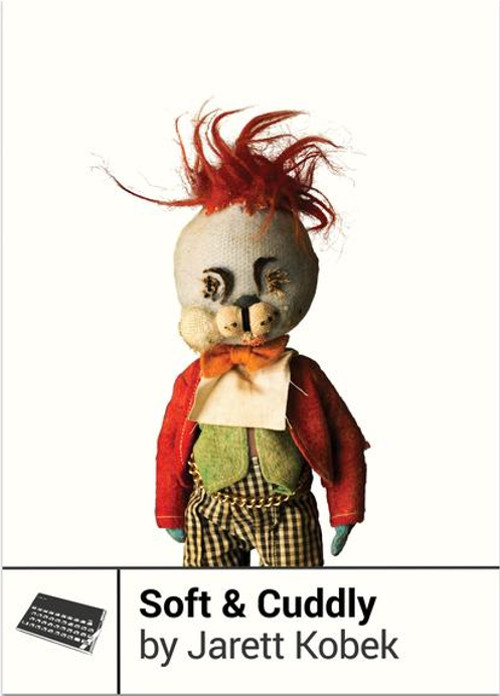
Soft & Cuddly (1987) and its predecessor Go to Hell (1985) were horror games published on cassette tapes for what is now an obscure British computer system. The games were proudly the products of a teenager’s boredom and embraced the label “Video Nasties” that was used in the 1980s by Britain’s elite to damn subversive media. Soft & Cuddly is certainly subversive, as the game centers around picking up the limbs of your dismembered mother and occasionally visiting with your decapitated father in the refrigerator. Jarett Kobek’s book Soft & Cuddly, then, offers a strong, strange, yet cleanly organized timeline of Go to Hell, Soft & Cuddly, and one of gaming’s youngest and most abrasive auteurs. The opening pages of Kobek’s book command:
So picture it. There’s John George Jones. He’s living in southeastern England. It’s the mid-1980s, he’s fourteen, and he’s programming Go to Hell on his ZX Spectrum. In a few years, he’ll be giving batshit interviews and writing astonishing letters to the gaming press.
Boss Fight Books is in the business of producing creative nonfiction that concentrates on a single video game. In this sense Kobek has cheated a little, as his Soft & Cuddly is just as much about John George Jones’s previous game Go to Hell, and both computer games appeared on the ZX Spectrum, as it is about the game Soft & Cuddly.
The ZX Spectrum was a cheaply produced and often-delayed British computing system: “It had a shit keyboard. It had shit sound. Its graphics bled color. It used audio cassettes to save and load data.” But that didn’t stop it from becoming, “the bestselling computer in British history, moving over five million units in its original and subsequent models.” Chief among the appeals of the system for gamers was that anyone could produce and eventually distribute games for the personal computer. Kobek notes the psychological impact being published on the same cassette tapes as more commercial games and even that generation’s most coveted musicians must have had on the British youth who programmed for the system: “The teenager who sat at his Spectrum, listened to Alice Cooper, and summoned demons,” would one day find their “product in high-street shops, the British equivalent of America’s big-box retailers. In the same format as the shock-rocker … Black magic on a cassette tape.”
The most entertaining sections of Kobek’s book Soft & Cuddly surround the folklore of the game’s creator John George Jones and the ZX Spectrum. The sections that focus primarily on the gameplay of Soft & Cuddly and Go to Hell fail to engage in the same way. This is fitting for a game creator who vanished from the industry after Soft & Cuddly and made his apathy towards gaming public knowledge. When asked in an interview about his interest in computers, he responded, “’I’ve already lost interest. Most of the people who use them are boring. Hackers are just totally sad. Soft & Cuddly is for people who are bored with the other lousy games, and want something new ….”
In a previous HFR article on another Boss Fight Books title, Phil Spotswood points out the interwoven nature of gaming and our collective culture over the last decade. Perhaps the most interesting aspect of the book Soft & Cuddly is how well Kobek reveals the entanglement of gaming and England’s mental state in the 1980s. Kobek analyzes how Jones’s work was deeply entrenched in the “Video Nasties” era of British censorship. However, even that segment is outshined by Kobek’s explanation of how Margaret Thatcher (yes, that Margaret Thatcher) became the biggest champion of the ZX Spectrum. Eventually, Margaret Thatcher even “traveled to Japan and presented Japanese Prime Minister Zenko Suzuki with a Spectrum, intoning in the archest of voices, punctuated by aeon-long pauses, ‘Prime Minister, this is… a… small… home… computer…’”.
Kobek’s book Soft & Cuddly is a love note to all things grungy and bootleg, to everyone who managed to succeed despite standing in their own way. When the book shifts its focus to the 2014 spiritual successor to Jones’s Soft & Cuddly (Earl C.’s Fucker Gamer Scum Get Stabbed), Kobek reminds us that with the help of Steam and other online stores, certain pockets of the video game industry are returning to games made by one-person teams. The rockstars and auteurs of the industry are once again finding a good home. And while it has been a long time since we’ve been in the presence of cassette tapes, a long time since Thatcher’s fingers last graced a ZX Spectrum, a long time since John George Jones cared about computer games, Kobek is sure that they’ve helped lead us to our current elsewhere.
Soft & Cuddly, by Jarett Kobek. Los Angeles, California: Boss Fight Books, January 2017. 192 pages. $14.95, paper.
James Ardis is the author of Your Arkansas: A Strategy Guide (Gauss PDF, 2016), a project that combines psychosis and video game strategy guides. His writing has most recently appeared in FreezeRay, Devil’s Lake, and Leveler. His most recent criticism is available at The Collagist, and forthcoming from Entropy, and The Rumpus. You can contact him at jamesardiswriting@gmail.com.
Check out HFR’s book catalog, publicity list, submission manager, and buy merch from our Spring store. Follow us on Instagram and YouTube. Disclosure: HFR is an affiliate of Bookshop.org and we will earn a commission if you click through and make a purchase. Sales from Bookshop.org help support independent bookstores and small presses.


Leave a comment